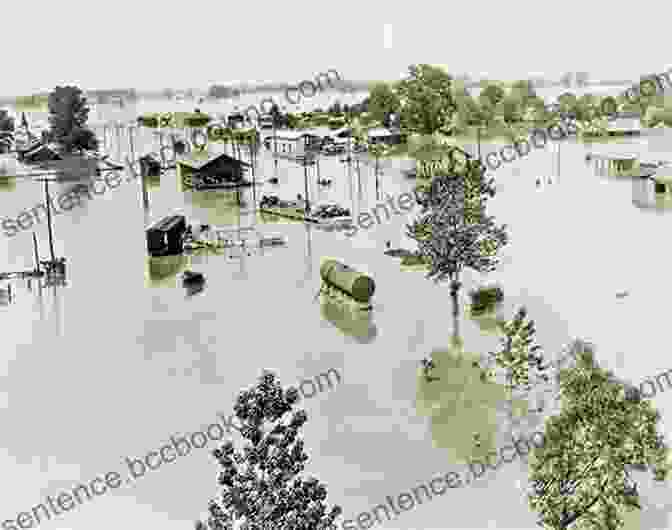The Great Mississippi Flood of 1927: A Transformative Event in American History


The year 1927 witnessed one of the most catastrophic natural disasters in American history: the Great Mississippi Flood. Unleashing its wrath upon the heartland of the nation, this relentless deluge reshaped the lives of millions and left an unforgettable mark on the annals of history. In this article, we delve into the profound impact of the Great Mississippi Flood of 1927, exploring its causes, consequences, and the enduring legacy it left on the American people.
4.7 out of 5
| Language | : | English |
| File size | : | 1786 KB |
| Text-to-Speech | : | Enabled |
| Screen Reader | : | Supported |
| Enhanced typesetting | : | Enabled |
| Word Wise | : | Enabled |
| Print length | : | 547 pages |
Unveiling the Causes: A Perfect Storm of Factors
The Great Mississippi Flood of 1927 was the culmination of a series of extraordinary meteorological events. Heavy rainfall, originating in the Rocky Mountains and exacerbated by a stalled weather front, saturated the Mississippi River basin for weeks. As the river swelled to unprecedented levels, its levees, designed to protect riverside communities, began to crumble under the relentless pressure.
Adding to the devastation, torrential rains continued to pound the region, further exacerbating the flooding. The Mississippi River, swollen and unstoppable, breached its banks in multiple locations, unleashing a torrent of water that inundated vast swaths of land. By April 1927, the floodwaters had spread across a staggering 27,000 square miles, affecting seven states and displacing over a million people.
The Wrath of the Waters: Devastating Consequences
The Great Mississippi Flood of 1927 left a trail of widespread destruction. Buildings, farms, and entire towns were submerged beneath the relentless waters. Countless lives were lost, with estimates ranging from hundreds to thousands.
Inundated cities transformed into desolate islands, their infrastructure crippled and daily life brought to a standstill. Businesses closed, schools were abandoned, and entire communities were cut off from essential supplies and communication. The floodwaters ravaged crops, livestock, and farmland, decimating the agricultural economy of the region.
The human suffering caused by the flood was immense. Displaced families sought refuge in makeshift camps, often overcrowded and unsanitary. Disease and hunger spread rapidly, adding to the misery of the survivors. The floodwaters also destroyed homes, businesses, and cultural landmarks, leaving an enduring scar on the affected communities.
Government Response and the Seeds of Change
The Great Mississippi Flood of 1927 exposed the inadequacies of the nation's flood control infrastructure and prompted a significant shift in government policy. President Calvin Coolidge authorized the formation of a special relief commission to coordinate disaster response efforts, and Congress allocated millions of dollars in aid to the affected areas.
However, the flood also highlighted the racial disparities prevalent in American society. While white flood victims received immediate assistance, African American communities were often neglected and faced discrimination in the distribution of aid. This disparity sparked outrage and led to calls for greater social justice and civil rights.
In the aftermath of the flood, a comprehensive flood control plan was developed and implemented. The Mississippi River Commission constructed a vast network of levees, floodwalls, and reservoirs, designed to mitigate future flooding. These measures significantly reduced the risk of catastrophic flooding, although the region remains vulnerable to occasional flooding events.
Socioeconomic Impact: Reshaping the Nation's Fabric
The Great Mississippi Flood of 1927 had a profound socioeconomic impact on the United States. The destruction of agricultural land and infrastructure weakened the agricultural economy, particularly in the South. Many flood-ravaged communities struggled to recover, leading to a decline in population and economic activity.
Conversely, the flood also accelerated the migration of African Americans from rural areas to northern cities in search of better opportunities. This northward movement, known as the Great Migration, had a lasting impact on the urban landscapes of cities like Chicago, Detroit, and New York.
The flood also brought about a renewed appreciation for the importance of environmental conservation. The widespread devastation caused by the flood led to increased awareness of the need to protect watersheds and manage water resources responsibly.
Cultural Legacy: Stories, Images, and Enduring Memories
The Great Mississippi Flood of 1927 left a lasting imprint on American culture. It became a subject of countless books, articles, and documentaries, preserving the memory of the catastrophic event and its impact on the nation.
Folk songs and blues music emerged from the flood, reflecting the resilience and suffering of the flood survivors. Artists such as Huddie "Lead Belly" Ledbetter and Muddy Waters immortalized the flood through their poignant and evocative songs.
The flood also captured the attention of photographers and journalists, who documented the devastation and the human stories behind it. Their powerful images and eyewitness accounts provided a visual record of the disaster, preserving its memory for future generations.
The Great Mississippi Flood of 1927 was a watershed moment in American history. This catastrophic event reshaped the nation's physical landscape, socioeconomic fabric, and cultural tapestry. It exposed the vulnerabilities of the Mississippi River system, leading to significant flood control measures. The flood also highlighted racial inequalities and sparked calls for social justice. Through its lasting legacy in stories, songs, and images, the Great Mississippi Flood of 1927 continues to remind us of the power of nature and the resilience of the human spirit.
4.7 out of 5
| Language | : | English |
| File size | : | 1786 KB |
| Text-to-Speech | : | Enabled |
| Screen Reader | : | Supported |
| Enhanced typesetting | : | Enabled |
| Word Wise | : | Enabled |
| Print length | : | 547 pages |
Do you want to contribute by writing guest posts on this blog?
Please contact us and send us a resume of previous articles that you have written.
 Book
Book Novel
Novel Page
Page Chapter
Chapter Text
Text Story
Story Genre
Genre Reader
Reader Library
Library Paperback
Paperback E-book
E-book Magazine
Magazine Newspaper
Newspaper Paragraph
Paragraph Sentence
Sentence Bookmark
Bookmark Shelf
Shelf Glossary
Glossary Bibliography
Bibliography Foreword
Foreword Preface
Preface Synopsis
Synopsis Annotation
Annotation Footnote
Footnote Manuscript
Manuscript Scroll
Scroll Codex
Codex Tome
Tome Bestseller
Bestseller Classics
Classics Library card
Library card Narrative
Narrative Biography
Biography Autobiography
Autobiography Memoir
Memoir Reference
Reference Encyclopedia
Encyclopedia Jo Tatchell
Jo Tatchell Joanna Nylund
Joanna Nylund John E Siers
John E Siers Nunzio Pernicone
Nunzio Pernicone Joanne B Mulcahy
Joanne B Mulcahy Joan Wiener Bordow
Joan Wiener Bordow John Canarina
John Canarina Joe Glickman
Joe Glickman Mike Lanza
Mike Lanza Sarah Morgan Haydock
Sarah Morgan Haydock Sarah Simon
Sarah Simon Natasha Newton
Natasha Newton Joanna Faber
Joanna Faber Joel Best
Joel Best Noah Van Sciver
Noah Van Sciver John Mackey
John Mackey Patrick Thomas
Patrick Thomas John Assaraf
John Assaraf Joe Hendershott
Joe Hendershott John Ibbitson
John Ibbitson
Light bulbAdvertise smarter! Our strategic ad space ensures maximum exposure. Reserve your spot today!

 Dustin RichardsonUnleash the Majesty: Explore the Realm of Lions with National Geographic...
Dustin RichardsonUnleash the Majesty: Explore the Realm of Lions with National Geographic...
 Dominic SimmonsFunny Challenges That Kids And Families Will Love: Tricky Questions And Brain...
Dominic SimmonsFunny Challenges That Kids And Families Will Love: Tricky Questions And Brain...
 Bret MitchellThe Dad Report: A Father's Day Must-Read for Fathers, Sons, and Baseball Fans
Bret MitchellThe Dad Report: A Father's Day Must-Read for Fathers, Sons, and Baseball Fans Corbin PowellFollow ·18.1k
Corbin PowellFollow ·18.1k Anton ChekhovFollow ·2.8k
Anton ChekhovFollow ·2.8k Clark BellFollow ·13.6k
Clark BellFollow ·13.6k Luke BlairFollow ·5.8k
Luke BlairFollow ·5.8k Alan TurnerFollow ·17.5k
Alan TurnerFollow ·17.5k Stephen KingFollow ·13.2k
Stephen KingFollow ·13.2k Forrest BlairFollow ·9.2k
Forrest BlairFollow ·9.2k Barry BryantFollow ·9.4k
Barry BryantFollow ·9.4k

 Jesus Mitchell
Jesus MitchellDiscover the World of Satisfying Meals with Or...
In a world where culinary creations often...

 Darius Cox
Darius CoxJourney into the Extraordinary Life of Kublai Khan: An...
Immerse Yourself in the Fascinating...

 Gil Turner
Gil TurnerThe Fourth Industrial Revolution: The Precariat and the...
In his groundbreaking book, The Fourth...

 Jonathan Franzen
Jonathan FranzenGenghis Khan: His Heirs and the Founding of Modern China
Genghis Khan, the...

 Eugene Powell
Eugene PowellJourney Through the Golden Age of the Ottoman Empire with...
Delve into the Enchanting World of the...
4.7 out of 5
| Language | : | English |
| File size | : | 1786 KB |
| Text-to-Speech | : | Enabled |
| Screen Reader | : | Supported |
| Enhanced typesetting | : | Enabled |
| Word Wise | : | Enabled |
| Print length | : | 547 pages |







